11 and 25 January 2015 Welcome | February 8 | 15 and 29 March | 12 e April 19, 2015
Teatro Argentina | free admission
Light on the archeology
(Luce sull’archeologia)
Seven meetings at the Teatro Argentina to tell the extraordinary historical, artistic, archaeological and monumental Rome Free admission to availability reservation recommended to the numbers:
Tel: +39 06684000356
Tel: +39 06684000345
Seven meetings between history and art at the Teatro Argentina from 11 January to 19 April (11 hours) with which the Teatro di Roma, in collaboration with the Superintendence of Cultural Heritage Capital of Rome, Rome will tell, its size and its history as well as the richness and uniqueness of his extraordinary archaeological heritage and imagery contained in “fragments” of the ancient city.
A past that comes back in the present through a series of seven meetings with free entry titled Light on archeology to give emotions, discoveries and knowledge, contributing to the enhancement and protection of our heritage to preserve and pass as a milestone of culture.
Light on archeology and the contribution that marks a significant step in the service that the Theatre of Rome wants to make to the broader public, a journey where you can meet the multiple sets of the major ancient sites and where nature, art and history unite. Ancient paths and testimonies signs millennial history and culture are an accurate track of a recognition of the continuity of Rome, of a splendor partly dissolved but that has never stopped a relationship with our modern civilization.
Among the scholars who have accepted the invitation: Maria Rosaria Barbera, Luciano Canfora, Andrea Carandini, Francesca Greys, Philip Coarelli, Fedora Filippi, Patrizia Fortini, Eugenio La Rocca, Marina Mattei, Claudio Parisi Presicce, Rossella Rea, Andreas M. Steiner Claudio Strinati.
First appointment with the immense legacy of Rome and its wonders of rare beauty Sunday, January 11 (11 hours) with a meeting dedicated to the death of Caesar entitled “The Ides of March in Largo Argentina: The assassination of Julius Caesar in Curia of Pompey, “one of the most present in the collective imagination, but little known in its topographical location and planning (the conspiracy took place in fact within the Curia of Pompey, on the whole, who occupied the southern plain of the Campus Martius). Introduces Claudio Parisi Presicce (Superintendent Capitoline Cultural Heritage) with assistance of Philip Coarelli (archaeologist and Professor Emeritus of Roman History and Greek and Roman antiquities), Marina Mattei (archaeologist of the Capitoline Museums and scientific director of the excavations of the sacred area of Torre Argentina), while Maddalena Crippa reads passages from Julius Caesar by William Shakespeare, Caesar by Suetonius, and De Catilinae coniuratione Sallust.
It continues January 25 (11 hours) with “Augustus: the places of power”, the meeting dedicated to the genius of Augustus scorer of that principality which will result, among his successors, the empire and to the sense of the sublime that captures the architectural vocabulary of public and private. Speakers Luciano Canfora (historian of the ancient world, and Professor of Greek and Latin philology at the University of Bari), Corrado Augias (writer and journalist), Maria Rosaria Barbera (Superintendent for Archaeological Heritage of Rome), while Toni Servillo the law ‘the introduction to the Book of the Annals of Tacitus, the Res Gestae Divi Augusti, written by the emperor himself, and passages from Virgil’s Aeneid.
The appointment of 8 February (11 hours) is devoted to the architectural symbol of Rome, “The Colosseum: Myth and Reality”, by the grandeur of the size that it offers extraordinary exemplification of construction techniques, the sense of awe for the exceptional architectural miracle, caught in the images of the artists. Speakers Rossella Rea (official in charge of the Colosseum, Special Superintendence for Archaeological Heritage of Rome), Claudio Strinati (art historian, former General Manager of the Museums of Rome), while Peppe Servillo reads passages from De Spectaculis of Martial, by Dio Cassius and Satyricon of Petronius.
The journey continues March 15 (11 hours) with “The Roman Forum: from the origins to the barbarian invasions” for a summary of the historical, topographical and archaeological heart of Rome through the times. Speakers
Philip Coarelli (archaeologist and Professor Emeritus of Roman History and Greek and Roman antiquities at the University of Perugia), Patrizia Fortini (official archaeologist in charge of the State Superintendent of the Roman Forum), while Filippo Timi reads passages from Livy Ab Urbe seasoned.
Following the appointment of 29 March (11 hours) with “The Theatres of Pompey, and Marcello Balbo,” the great stone theaters of Campo Marzio perfectly integrated into the fabric of the city and a true symbol of power and community. Speakers Andrea Carandini (archaeologist and professor emeritus at the University of Siena and Rome La Sapienza) and Claudio Parisi Presicce, while Maddalena Crippa reads passages from Truculentus and Pseudolus Plautus.
It continues April 12 (11 hours) with a meeting dedicated to the too often forgotten world of the great women of the Imperial Roman first century. BC and the second century AD, “The women of” power “in imperial Rome”, a tribute of intelligence, poetry and beauty. Speakers Francesca Greys (Professor of History of Women in the classical world and Social History of the Ancient World at the University of Bologna), Andreas M. Steiner (editorial director of Archeo and the Middle Ages), while Iaia Forte reads verses of the poet and Roman Sulpicia songs Pro Caio Celio Cicero.
The exhibition closes with the meeting of 19 April (11 hours) entitled “The palace of Nero. The last emperor of the Julio-Claudian dynasty “for a portrait of the emperor who left the world the most sumptuous palace of all time. Speakers Fedora Filippi (scientific director of the Domus Aurea for the Superintendence for Archaeological Heritage of Rome 2009-2014), Eugenio La Rocca (Professor of Archaeology and History of Greek and Roman Art at La Sapienza – University of Rome, former General Manager Cultural Heritage of the City of Rome), while Roberto De Francesco reads passages from the Annals of Tacitus and Suetonius’s Lives of the Caesars.
ABOUT THEATRE OF ROME
Address: Largo di Torre Argentina, 52, 00186 Roma, Italy
{google_map}Largo di Torre Argentina, 52, 00186 Roma, Italy{/google_map}
Office promotion Theatre of Rome: tel. (+39)06.684.000.346 – Fax (+39) 06.684000.360 – www.teatrodiroma.net
Free admission to availability reservation recommended numbers tel.(+39)06684000356 – (+39)06684000345
Schedule of meetings in 2015
Sunday, January 11 .15
IDI THE MARCH TO LARGO ARGENTINA
THE ASSASSINATION OF JULIUS CAESAR IN CURIA THEATRE POMPEO
Institutional Greetings
Marino Sinibaldi President of the Teatro di Roma and Antonio Calbi Director of the Theatre of Rome Chaired and introduced by Claudio Parisi Presicce Superintendent Capitoline Cultural Heritage
Speakers
Philip Coarelli – Archaeologist and Professor Emeritus of Roman History and Greek and Roman antiquities
Marina Mattei – Archaeologist of the Capitoline Museums and scientific director of the excavations of the sacred area of Torre Argentina
Maddalena Crippa
reads passages from Julius Caesar by William Shakespeare, Caesar by Suetonius, and De Catilinae coniuratione Sallust
Sunday, January 25 .15
AUGUSTO PLACES OF POWER
Speakers
Luciano Canfora – history of the ancient world, and Professor of Greek and Latin philology at the University of Bari
Corrado Augias – Writer and journalist
Maria Rosaria Barbera – Superintendent for Archaeological Heritage of Rome
Toni Servillo reads the introduction to the Book of the Annals of Tacitus, the Res Gestae Divi Augusti, written by the emperor himself, and passages from Virgil’s Aeneid
Sunday, February 8 .15
THE COLISEUM MYTH AND REALITY
Speakers
Rossella Rea – Officer of the Colosseum, Special Superintendence for Archaeological Heritage of Rome
Claudio Strinati – Historian already Superintendent of Rome Museums
Peppe Servillo reads passages from De Spectaculis of Martial, by Dio Cassius and Satyricon of Petronius
Sunday, March 15 .15
THE ROMAN FORUM FROM THE ORIGINS TO THE BARBARIAN INVASIONS
Speakers
Philip Coarelli – Archaeologist and Professor Emeritus of Roman History and Greek and Roman antiquities at the University of Perugia
Patrizia Fortini – Officer archaeologist in charge of the State Superintendent Roman Forum
Filippo Timi reads passages from Livy Ab Urbe seasoned
Sunday, March 29 .15
THE THEATRES OF ANCIENT ROME THE THEATRES OF POMPEY, MARCELLO, BALBO
Speakers
Andrea Carandini – Archaeologist and Professor Emeritus at the University of Siena and Rome La Sapienza
Claudio Parisi Presicce – Capitoline Superintendent of Cultural Heritage
Maddalena Crippa reads passages from Truculentus and Pseudolus Plautus
Sunday, April 12 .15
DIVE AND WOMEN THE WOMEN OF “POWER” IN IMPERIAL ROME
Speakers
Francesca Greys – Professor of History of Women in the classical world and Social History of the Ancient World at the University of Bologna
Andreas M. Steiner – Archeo and Editorial Director of the Middle Ages
Iaia Forte reads verses of the poet Roman Sulpicia and tracks from Pro Caio Celio Cicero
Sunday, April 19 .15
THE PALACE OF NERO: THE LAST EMPEROR OF Julio-Claudian dynasty
Speakers
Fedora Filippi – Scientific Director of the Domus Aurea for the Superintendence for Archaeological Heritage of Rome 2009-2014 Eugenio La Rocca Professor of Archaeology and History of Greek and Roman Art at La Sapienza – University of Rome, former Superintendent of Cultural Heritage of City of Rome
Roberto De Francesco reads passages from the Annals of Tacitus and Suetonius’s Lives of the Caesars
The Rome Central – Italy in the world editorial staff consists of freelance editors, journalists, photographers, filmmakers, doctors, writers, video-makers, supporters, poets, writers, actors, singers and many friends.
RomeCentral is a Magazine completely no-profit , whoever writes in this magazine does his job without any commercial pressure.
NB: No people in Rome Central, from managers to employees etc .., receive any type of compensation.
The love for the free journalism repays all our efforts.

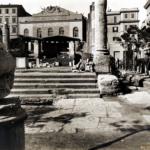
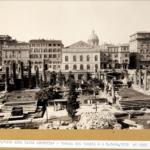
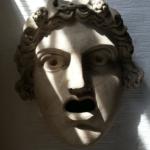
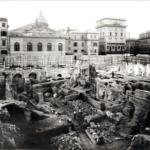
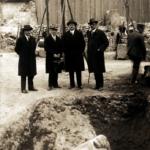
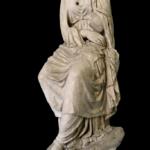
Fabbrica Applicazioni Iphone-iPad Iwfactory liked this on Facebook.